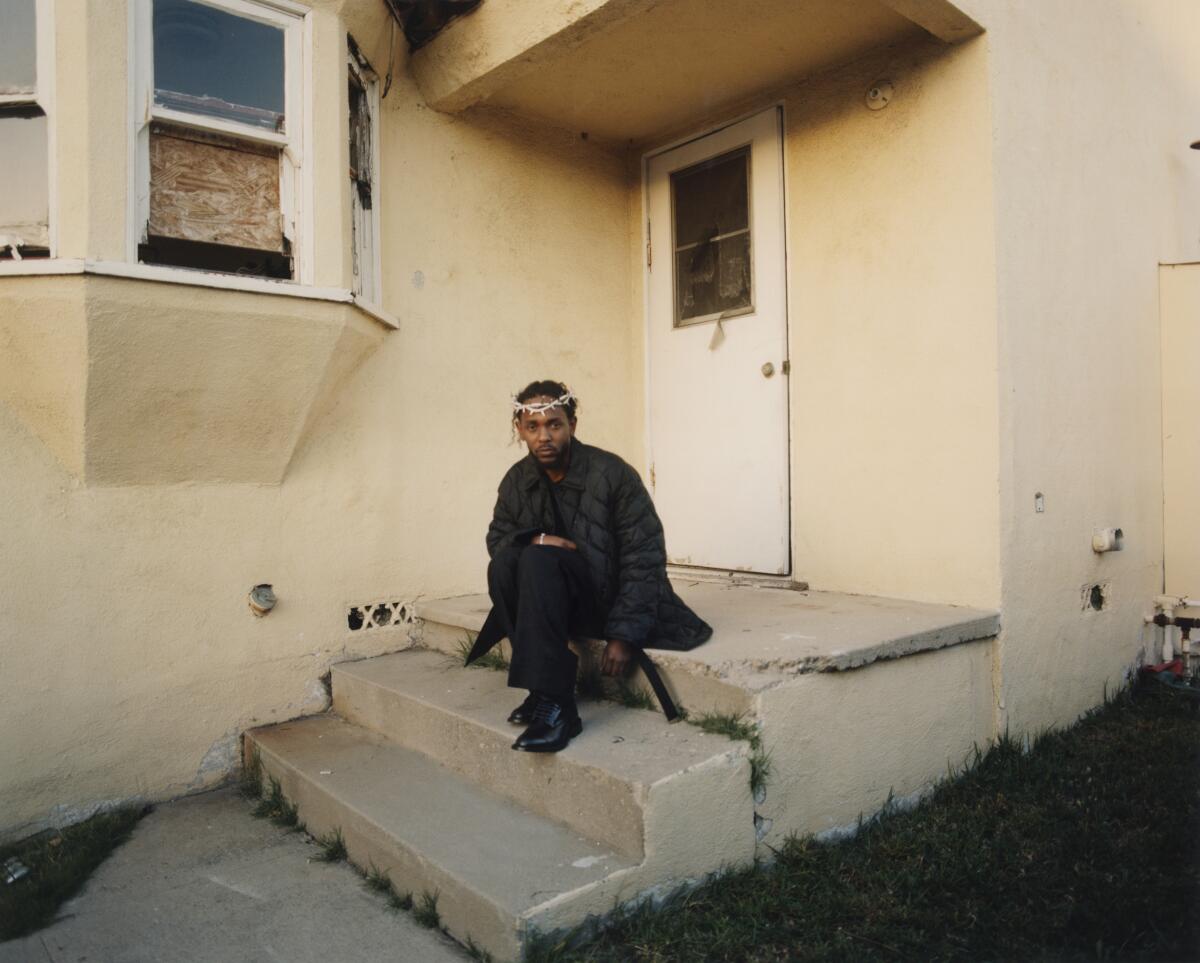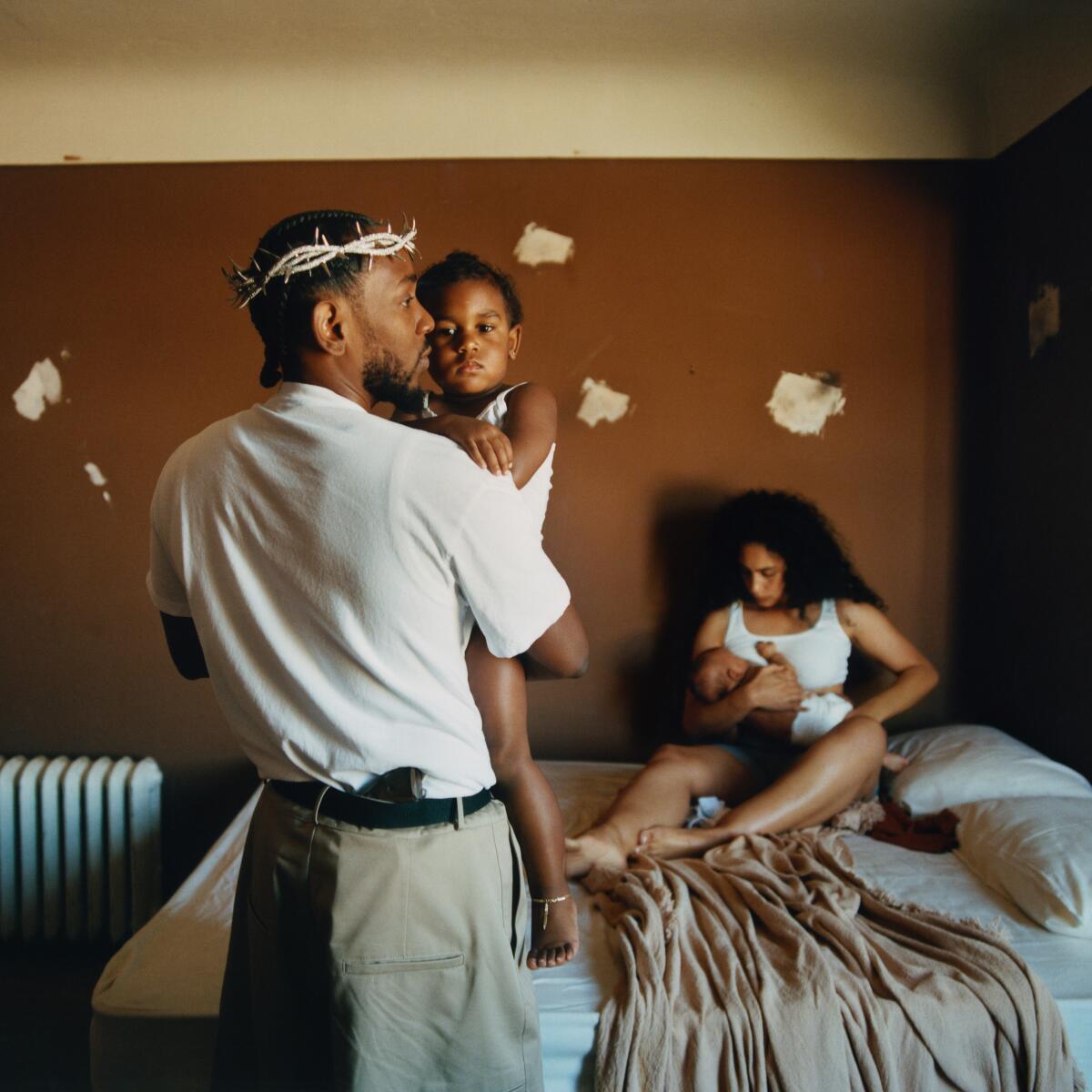Review: Forget voice of a generation — Kendrick Lamar’s just trying to get himself right

- Share via
Kendrick Lamar is not the man — and definitely not the hero — we thought he was.
That’s the painful yet liberating message embedded in the confessions, promises, demands and recriminations of “Mr. Morale & the Big Steppers,” the daring new album from the 34-year-old Compton-born rapper who has shouldered more expectations over the last decade than any other hip-hop superstar.
Released Friday, the 18-track set — split into halves on streaming services such as Spotify, where its songs immediately racked up tens of millions of plays — arrives five years after Lamar’s previous studio album, “Damn,” which spun off hit radio singles, won a Pulitzer Prize (a first for a non-classical or non-jazz musician) and led to a gig assembling the Oscar-nominated soundtrack to 2018’s smash “Black Panther” movie.
But if his success pushed him into a voice-of-a-generation role he once seemed eager to fill — “Heavy is the head that chose to wear the crown,” he says at one point here, adding a crucial note of volition to the Shakespeare he’s paraphrasing — the forced introspection of the pandemic has reoriented the scope and focus of his work. What he found when searching within clearly left him with doubts about his suitability, not to mention his desire, to articulate grand communal ideas about family, religion, politics and Black identity.
“I’ve been going through something,” he declares over a jittery piano lick in the LP’s opener, “United in Grief.” Then he adds: “Be afraid.”

“Mr. Morale & the Big Steppers” is framed as a kind of extended therapy session, one Lamar has undertaken at the behest of a female presence voiced by his real-life romantic partner, Whitney Alford, who appears on the album’s cover along with Lamar and their two young children. (Eckhart Tolle, a German self-help guru championed by Oprah Winfrey, turns up several times in the guise of Lamar’s therapist.)
The MC starts out pondering his addiction to sex but also examines his materialism and his fraught relationship with his father; “We Cry Together,” which feels more like a radio play than a rap song, dramatizes a brutal fight between him and a lover played by actress Taylour Paige. “Auntie Diaries” traces the long arc of his experiences with two transgender relatives, including the callousness with which he used the homophobic F-slur as a child. And the epic “Mother I Sober,” which features a rare vocal performance by Beth Gibbons of Portishead, locates Lamar’s place — as a witness and a possible victim — in a family legacy of domestic sexual abuse.
“I wish I was somebody / Anybody but myself,” Gibbons sings, so quietly as to sound like a thought in the back of Lamar’s head.
On ‘Auntie Diaries,’ Lamar explores his relationship with his trans relatives ‘in a way that holds truth... to the transphobia and homophobia in hip-hop.’
His rapping on these subjects is frequently astonishing, with vivid phrasing that he puts across in a vast array of voices and flows — low and gravelly, high and pinched, a bark, a purr, a croon — each illuminating a different point of view in the knotty and intimate scenarios he’s imagining or reliving. “Oh, this the part where mental stability meets talent / Oh, this the part he breaks my humility just for practice,” he raps on “Father Time.” “Tactics we learned together / Sore losers forever / Daddy issues.”
On “Worldwide Steppers” he unsparingly recounts two incidents of infidelity, both with white women, and you have to marvel at the way he builds the complexities of race and class into these personal tales: “She drove her daddy’s Benz / I found out that he was a sheriff / That was a win-win because he had locked up Uncle Perry / She paid her daddy’s sins.”

The varied production, by an expansive crew that includes longtime collaborators such as Sounwave and DJ Dahi, shifts along with Lamar, alternately bulking up with heavy drums and thick keys and stripping down to strings and piano. Ghostly vocals by singer Sam Dew are threaded throughout the album, and there are striking guest turns by Sampha, Lamar’s cousin Baby Keem and the unlikely pairing of Summer Walker and Ghostface Killah, who team with Lamar for “Purple Hearts,” a woozy R&B cut built around a morsel of hard-won advice: “Shut the f— up when you hear love talking.”
Lamar’s intricately plotted narratives set him apart from much of modern hip-hop, which prizes vibe over storytelling; here, as distinct from the sleekly commercial “Damn,” the music can feel just as out-there, with songs that lurch between beats and songs that have no beats at all. (The chamber-jazz “Crown” lands somewhere between Radiohead and late-period Joni Mitchell.)
All this self-laceration comes with an amount of indignation. Lamar raps repeatedly about cancel culture — he thinks it’s a real thing, and he’s not a fan — and in musing on his own moral failures he goes so far as to wonder whether R. Kelly, a convicted sex offender, has been unfairly treated. He also loans his platform on more than one occasion to rapper Kodak Black, who has been accused of sexual assault; what’s more, Lamar seems to have sought out Kodak not in spite of the charges but because of them — because of the opportunity Kodak offers to engage thoughts of forgiveness.
If this calls to mind Kanye West’s recruiting Marilyn Manson to appear on last year’s “Donda,” it should; the two acts — the two provocations — are functionally the same. What distinguishes them, of course, is the context: Where few would say Kanye has much virtue to spread around these days, Lamar is regarded by many as a saint.
That’s a mistake, he argues over and over on “Mr. Morale,” never more succinctly than on “Savior,” which insists he’s not one. “I rubbed elbows with people that was for the people,” he raps, before deciding: “They all greedy.” He sounds disappointed but not surprised.
More to Read
The biggest entertainment stories
Get our big stories about Hollywood, film, television, music, arts, culture and more right in your inbox as soon as they publish.
You may occasionally receive promotional content from the Los Angeles Times.












